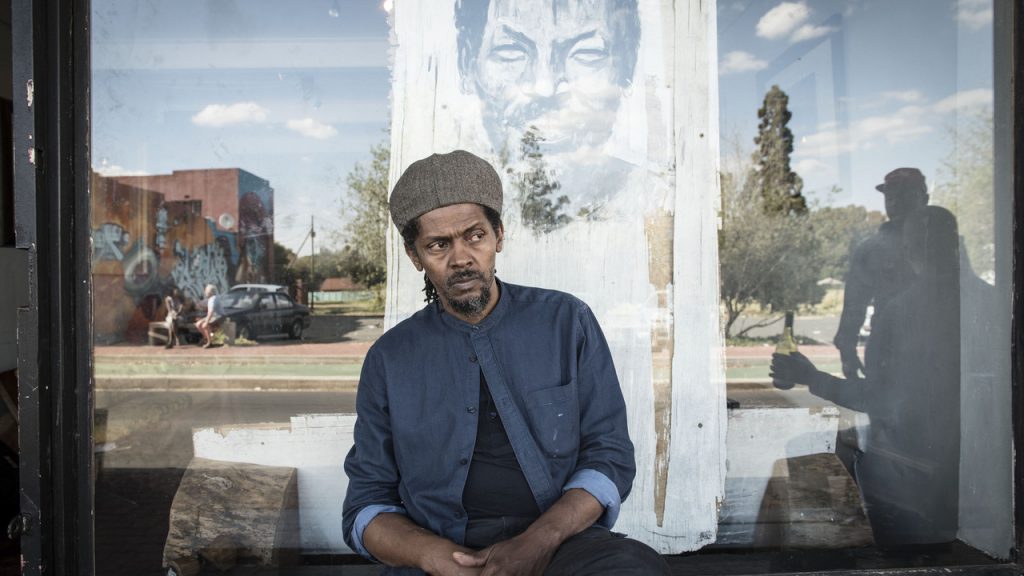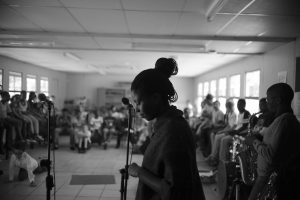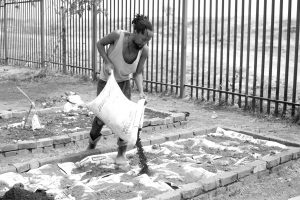[hr]
The pretence of cultural hubs in the “world class” metropolis of Johannesburg and its sibling Pretoria belies revolutionary models for live performance that are at a remove from the path of “gentrification’s death march” and benevolent corporate sponsorship. Kwanele Sosibo knows and goes where boundaries are broken and new tings flourish.
[hr]
One can only enter the Afrikan Freedom Station once. By that I mean each experience feels new and self-contained. This illusion has mostly to do with the incandescent powers of music.
Each act seems to cleanse and christen the place anew with each set. There’s the Malcolm Jiyane Tree’o collapsing the boundaries of composition and improv on a desolate Freedom Day. There’s Linda Buthelezi emerging from oblivion to carve his own space in the untold story of Zulu (Xulu?) rock. And there’s the instinctive archaeology of Madala Kunene and Chico Antonio’s acoustic guitar bra’skap.
In the constantly changing, but generally still-life stretch that is Thornton Road, in western Johannesburg, the Station pulses with an energy from an era six decades removed but also hitherto unseen.
Situated in Westdene, on the edge of Sophiatown, its founder regards it as a shrine “to the unacknowledged ancestors of art in the city”.
Says Steve Mokwena, founder and stationmaster: “When you’re driving on the M1 you see the spears going up. You see the malls, the churches, everybody doing it. This thing of ours, whatever you want to call it, maybe black culture… what is its expression? What is the one thing physically, in the memory of the city, that when I look at that, I see Kippie Moeketsi, I see Dolly Rathebe, I see David Koloane and Dumile Feni?”

Its gigs never turn a profit – at most, it holds roughly 40 patrons. Its bar, with R10 shots and R15 beers, probably just barely helps it tick over. Its door policy is weighted on conscience rather than the usual demand to cough up at the front door.
“The custom of the place works against it, at another level, when it comes to rands and cents,” says Bra Steve from a bench at the bar, to a soundtrack of Kendrick Lamar and Talib Kweli, “because we built it around the idea that money can come between people and art. And that’s how it grew. But on the other hand, if we get a hundred people in and they’re paying 100 bucks, then we have money to pay the band.”
Bra Steve is paradoxical without trying to be, on the one hand averse to shutting out Westdene’s tight-fisted freeloaders while, on the other, foreseeing a self-sustaining jazz economy. The man has a dervish streak, coupled with a can-do mojo probably pilfered from his own film career.
“A few years ago I watched the hip-hoppers build Back to the City, because I was very close to Hymphatic Thabs. We were working on films when they were doing that. In all of that, there was never somebody from the outside that said they are going to give them money to help them build hip-hop. People were sweating and doing it themselves. And now, that thing is able to pull about 15,000 people into the city centre when it happens. For creative music and for jazz, that is the opportunity that stares us in the face… It’s where we are supposed to be going.”
To be more accurate, Back to the City is a bloated, sponsors’ playground now, but Bra Steve is talking about laying foundations here. “There is no industry, that’s why we are able to do what we do. I feel that we could fill the Bassline with Linda Buthelezi’s show, with Malcolm [Jiyane] and somebody else’s show. We should be able to, and that’s the money. Him recording and selling that stuff.”
Outside on Thornton Road, a whites-only bar operates half-heartedly, as if its racists are slowly wavering in their convictions. Second-hand shops beg to be loosed from their lease agreements. Pentecostals have packed for St Elsewhere, in search of gullible converts. In the vacuum, it is Bra Steve doing the poaching.
“You have to be agile, you have to be clever. You know the place. There was no pizza oven. This man used to work at Catz Pyjamas,” he says, pointing to his chef, recruited from a now extinct restaurant up the hill in adjacent Melville.
The move from a jazz haunt with occasional curry to a bar with fridges stocking alcohol is purely economical for the stationmaster. Still, contributing to the “disintegration” of his patrons is, by his own admission, a sore sight. It’s like the one depicted in the admonishing tone of his film Jazz Heart, in which he confronts (literally, not figuratively) his drunken father’s abusive behaviour towards his mother.
Freedom Station is not without the protective guild of ancestors, both those to whom the music is offered and the guides who have walked the fatal road to freedom before. As Sifiso Ntuli of Politburo and House of Nsako will tell you, there is no live scene in South Africa, at least not without the sponsorship of a benevolent corporate. But there are strings attached, ones Steve has attempted to cut loose.
“I applied for a grant for this place with fund raisers who work with European funders,” he says.
“They can’t give us the money, because we don’t have an NPO. ‘Give us the board and the governance,’ they say. Kiri, let’s have an upside down conversation: ‘What are the outcomes that you are pursuing? Because social cohesion, creative self-expression, enterprise, list all of them… gender empowerment, anti-xenophobia.’ We’re not an entity that looks the part. That part is we can achieve all these outcomes and more. So do we want to look the part? No.”
The refusal to “look the part”, Bra Steve says, is because democratic societies “depend as much on functional government as they do on an obstinate citizenry that raises the bar on what it means to be a human being in the world… We’ll get to where we want to get to with what we have. You don’t do that stuff cap in hand waiting for someone to fund you.”
Bra Steve, a recovering alcoholic, says the last thing on his mind was to sell alcohol, but he “needs it to sponsor the guys…” – which I take to mean the musicians. “The white business folk who run the city’s entertainment infrastructure from Maboneng to Juta Street, to Orbit, to Norwood to Rosebank, they have a head start on us,” says Bra Steve. “They have a head start in terms of their ability to comply with a whole plethora of legislation about how to do business in this city. They have got a jump start on us in terms of capital. Because no matter how flowery my vision of Freedom Station or Sophiatown is, built on the memory of ancestors, can be, if I can’t back it up with real money and proper infrastructure…”
Bra Steve’s ultimate wish is to take the Freedom Station into Sophiatown, “buy two stands and build a cultural cathedral that will stand for this and what came before it, but you don’t do that stuff cap in hand waiting for someone to fund you.”
***[twocol_one]On a nippy summer’s night in Pretoria, guitarist Sibusile Xaba wears a glowing smile as he watches a quartet fronted by Oscar Rachabane wind down a number. The “glowing” is no exaggeration, of all the 20 patrons, most of them outside. Xaba seems most enraptured by the music, sitting so close to the musicians he could touch them.
The venue Rachabane’s band is playing in is a corner of a sprawling complex Xaba and a few others operate under the banner of the Capital Arts Revolution (CAR), a Pretoria-based arts movement that takes it cues from the likes of the Medu Arts Ensemble and Black Consciousness activists such as Lefifi Tladi.
Slipping outside to talk, it is like Xaba has awoken from a dream. The vision for U-The Space is one that continues to morph according to the challenges of securing an artistic base in Pretoria. In a 2015 interview conducted with the guitarist, he spoke of the venue, then two houses with a central garden-cum-courtyard in Pretoria’s Sunnyside, as a space for gardening and playing rambling sets without stressing about the clock.
But in U-The Space as it looks now, part of the multiple block Old Fire Station in central Pretoria, Xaba has to cast the occasional glance at his wrist watch. He and a few members affiliated to CAR are in a race against the City of Tshwane’s efforts to evict inhabitants and rezone the space for other use.
According to the press, the city is locked in a tug of war with an arts organisation called Ngezandla Zethu Arts, Craft and Design Hub. In reality, a group of artists are trying to run the space as the Tshwane Arts Hub it is meant to be, as opposed to the rent racket it was, allegedly, in the hands of Tshepo Nkamba, who took over Ngezandla Zethu’s affairs after his mother passed on a few years ago.
“The city views the first respondent’s conduct as unlawful hijacking of the property. None of these occupiers has a valid or otherwise lease agreement with the city allowing them to remain on the property‚” Tshepo Sithole, the city’s director of litigation management said in court papers.
“The only thing tenants are supposed to be paying here is a security levy,” says Xaba, lighting up as the band continues. A core of spectators, some of them fellow musicians, watch from outside the windows, and amble onto the parking lot to refill their drinks from the boots of their cars. “The rent was being extorted, essentially. Many people here are under Ngezandla Zethu, and then there are those that are here through the City of Tshwane.”[/twocol_one]

[/twocol_one_last]
Xaba, I guess, speaks for those who see further potential in the space, there out of their own volition, driven by the necessity to create.
“Because the eviction notices kept coming, there were meetings to form a formal organisation that would manage the space, when we came in, last year July or August. We came in with a lot of questions. That’s when everything started coming up. The structure was never formal before. There was never such a thing. Artists were basically being used as a front, to say they were carrying out the mandate of the city but there wasn’t development.”
Referring to U-The Space specifically, Phemelo Sello, a slightly built man with dreadlocks styled into a bun, says he has been a part of the building since January 2015, when U-The Space started running an arts and music programme in one wing of the structure.
“It’s been occupied steadily since it stopped operating as a fire station; over time people have come. The arts hub transitioned after people had been living here for a while, so that makes it quite hard for it to be just about the arts, because there was already a community here.”
The Old Fire Station currently houses a mix of artists and craft makers, many with no allegiance to the Capital Arts Revolution. However, it is the site of countless gigs that disprove the myth of Pretoria as an artless capital, thanks to CAR.
The city has designated it as a heritage site, based on the age of the building. The Ditsong Museum of National History is next door, as well, and, according to Sello, archaeologists have found some artefacts in the grounds, which bolstered the case for the site to be considered a heritage site.
“They found small smoking pipes, handles for blades, from before the fire station got built on top of it,” says Sello.
In a sense, the Old Fire Station is the African Freedom Station’s still colonised but occupied cousin, brimming with ideals propagated by the very artists who, in other parts of the country and the world, are feted for their originality and vision. In Pretoria, they are merely occupiers and squatters who have to prove their worth.
Sello’s declaration about the smoking pipes, even though he doesn’t say so himself, suggests that an arm of CAR will hang on to this space for the very same reason the City of Tshwane wants it back: it is, in a sense, previously inhabited ancestral ground. The thought recalls CAR co-founder Lerato Kuzwayo standing in the dank bowels of the dome-shaped Capital Theatre, proclaiming the surrounding Church Square to have probably been a precolonial seat of chief Tshwane.
Ndumiso Dladla, a lecturer of philosophy at the University of South Africa and a convener of Philosophy in the Park, a collaborative project that takes place in association with CAR, says part of this organisation’s struggles are its limited legal clout and the shoddy state of bureaucratic record keeping in the city.
“The state has limited knowledge of its own properties, it doesn’t know what it owns. It took forever to establish that Capital Theatre (a Renaissance style theatre off the Square that now serves as a damp parking lot) belonged to the Department of Public Works. The legal process at the fire station is ultimately layered. CAR is not even the first respondent in the case with the city. There are sixteen others and CAR is enjoined as [just] another party.”
Kuzwayo says everything, for now, is consolidating around the Old Fire Station “as a venue we have access to for now.”
For all the supposed progressiveness, and – to use a hackneyed World Cup phrase – “world class” pretensions of Johannesburg and its sibling Pretoria, the best culture occurs in places that are removed from the trendiness of gentrification’s death march. For sure, Bra Steve’s economic model for the Freedom Station renders the space a shebeen, in the most revolutionary iteration of a booze spot.
The rainbow’s beautiful children, who have all treated us to sets through the Freedom Station’s wall to ceiling glass windows, know too that the power lies in their hands. That was where I first saw Xaba, working out the phrase “ngisebenzela izingane zami nezingane zezingane zami” (I work for my children and my children’s children). At the Old Fire Station is where its meaning takes shape.
*The New Thing is an ongoing series exploring new spaces for radical culture in South Africa. Read Part I here.
[hr]
This piece appears in the Chronic (April 2017). An edition which aims to complicate the questions raised by food insecurity, to cook and serve them differently.
Food is largely presented as scarcity, lack, loss – Africa’s always desperate exceptionalism or exceptional desperation or whatever. In this issue, we put food back on the table: to restore the interdependence between the mouth that eats and the mouth that speaks, and to delve deeper into the subtle tactics of resistance and private practices that make food both a subversive art and a site of pleasure.
To purchase in print or as a PDF head to our online shop, or get copies from your nearest dealer.
[button link=”http://www.chimurenga.co.za/chimurengashop” color=”red”]Buy the Chronic[/button] [button link=”http://www.chimurenga.co.za/subscribe” color=”red”]Subscribe[/button][hr]





